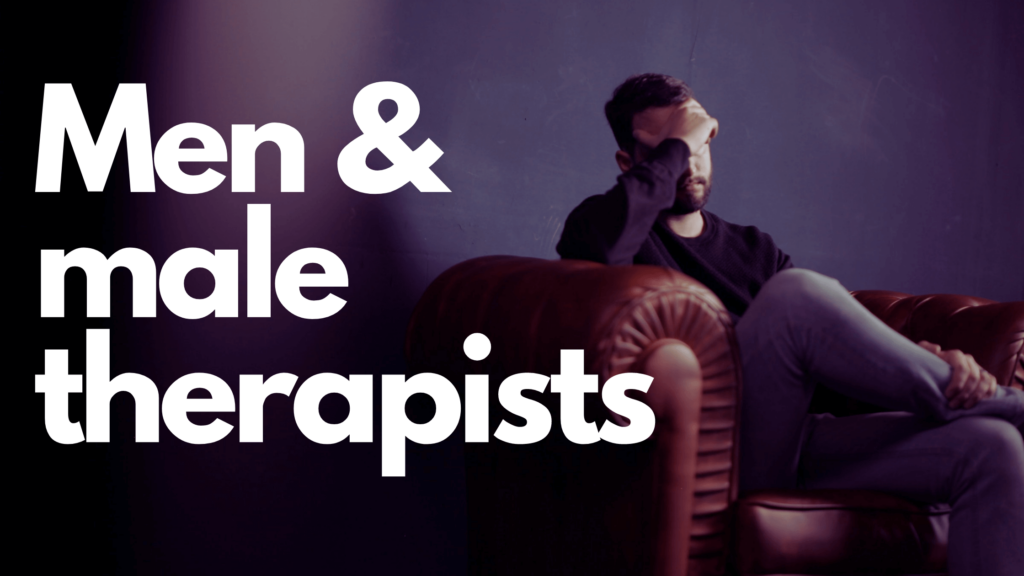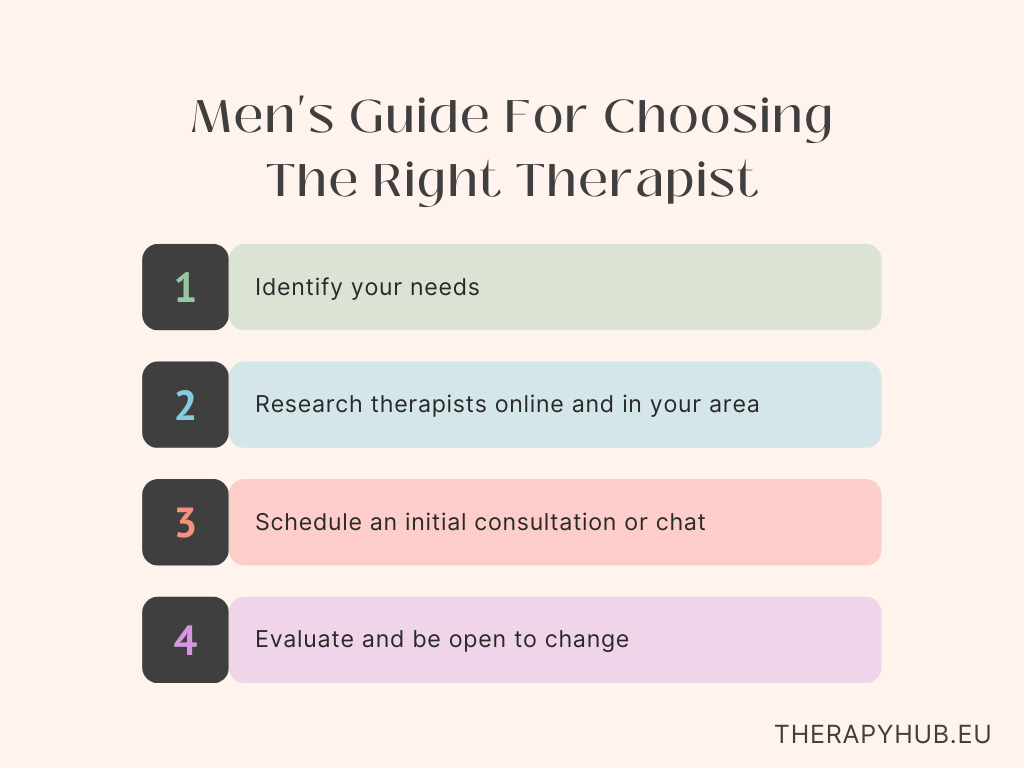
Welcome to this comprehensive guide on a topic that often sparks curiosity and debate – the role of male therapists, or men as therapists, in counselling.
In this post, I’ll be discussing various aspects of therapy and addressing some of the most common questions around the subject of male therapists. Though this guide is specifically tailored for men who are thinking about attending counselling, I aim to provide everyone, regardless of gender, with valuable insights to help you make informed decisions about your mental health journey.
Understanding the World of Therapy
Defining therapy and its purpose
Therapy, also known as counselling or psychotherapy, is a process in which an individual works with a trained professional to address various emotional, psychological, and behavioural issues. The primary purpose of therapy is to help individuals better understand themselves, their relationships, and their circumstances, ultimately leading to improved mental health and overall wellbeing.
The therapeutic relationship between a client and therapist is built on trust, empathy, and confidentiality, which allows for a safe space to explore thoughts, feelings, and behaviours openly. Through this process, clients can gain insight, develop coping strategies, and make meaningful changes in their lives.
Different types of therapy and their benefits
There are several types of therapy, each with its unique approach and techniques. Some of the most common forms of therapy include:
- Cognitive Behavioural Therapy (CBT): CBT focuses on identifying and changing negative thought patterns and behaviours. This approach is particularly effective for individuals dealing with anxiety, depression, and stress-related issues.
- Psychodynamic Therapy: This approach explores unconscious thoughts and emotions, often stemming from past experiences, to understand current behaviours and feelings. Psychodynamic therapy can be beneficial for those who want to delve deeper into the root causes of their issues.
- Humanistic Therapy: This type of therapy emphasises personal growth, self-awareness, and the inherent potential for positive change. Humanistic therapy can be helpful for individuals seeking to enhance their overall wellbeing and self-esteem.
Each type of therapy offers its own set of benefits, and the right approach will depend on your specific needs and preferences. It’s important to explore different options and find a therapist and approach that resonate with you.
Gender and Therapy
A really brief history of gender roles in society
Throughout history, gender roles have been deeply ingrained in our societies, shaping the way we think, behave, and interact with one another.
Traditionally, men were expected to be strong, stoic, and unemotional, while women were often seen as emotional, nurturing, and communicative.
These stereotypes have contributed to various misconceptions and expectations regarding mental health and therapy, particularly for men.
How our understanding of gender has evolved
In recent years, our understanding of gender has shifted significantly, moving away from a binary system towards a more inclusive and fluid spectrum. This shift has allowed for a more nuanced understanding of how gender intersects with mental health and therapy. We now recognise that gender roles and expectations can impact mental health, and that therapy should be adaptable to meet the unique needs of each individual, regardless of their gender identity.
The impact of gender on mental health and wellbeing
Traditional gender roles and societal expectations can have significant implications on mental health and wellbeing, particularly for men. In many societies, men are often expected to be stoic, emotionally reserved, and self-reliant, which can lead to a range of mental health challenges.
For instance, the pressure to conform to the ‘strong, silent’ stereotype can make it difficult for men to communicate their emotions effectively. This can lead to feelings of isolation, as they may be hesitant to share their thoughts and feelings with others, even close friends or family members. The inability to express emotions can have a detrimental impact on mental health, contributing to increased rates of depression, anxiety, and other mental health issues among men.
The impact of these societal expectations and gender roles on men’s mental health cannot be understated. Research has shown that men are less likely to seek help for mental health issues than women, which can lead to untreated mental health problems and, in some cases, an increased risk of suicide. In fact, men are more likely to die by suicide than women, highlighting the urgent need to address these barriers and encourage men to seek help when needed.
However, there is hope. As our understanding of mental health and gender evolves, there has been a growing movement to challenge and dismantle these harmful stereotypes and expectations. Campaigns, such as Movember and Men’s Health Forum, work to raise awareness about men’s mental health issues and encourage open conversations about mental wellbeing.
Q&A – Answering Your Most Common Questions
What do men go to therapy for?
Men seek therapy for a wide range of reasons, just like anyone else. Some common reasons include stress, anxiety, depression, relationship issues, grief and loss, substance abuse, and coping with life transitions. Ultimately, therapy can be beneficial for anyone looking to improve their mental health and wellbeing, regardless of their gender.
Is it OK to have a male therapist?
Absolutely! Choosing a therapist is a personal decision, and it’s essential to find someone you feel comfortable with and trust. Some people may prefer a male therapist due to shared experiences or a sense of understanding. Ultimately, the most important factor is finding a therapist who is a good fit for your needs and preferences.
Should a male use a male therapist?
There is no one-size-fits-all answer to this question. Some men may feel more comfortable discussing their issues with a male therapist, while others may prefer a female therapist or a therapist with a different gender identity. The key is finding a therapist who you feel understands you and with whom you can build a strong therapeutic relationship.
Is it good to have a male therapist?
Having a male therapist can be beneficial for some men, especially if they feel that a shared gender identity may enhance their therapeutic relationship. However, the quality of therapy depends on the skills and expertise of the therapist, rather than their gender. It’s essential to choose a therapist based on their qualifications, experience, and ability to address your specific needs.
What are the benefits of a male therapist?
Some potential benefits of working with a male therapist include a shared understanding of societal expectations and pressures faced by men, as well as the possibility of increased comfort when discussing gender-specific issues. However, it’s important to remember that the effectiveness of therapy depends on the individual therapist and the rapport you build with them, rather than their gender alone.
Is it better to talk to a female or male therapist?
There’s no definitive answer to this question, as the best therapist for you will depend on your unique needs, preferences, and comfort levels. Some individuals may feel more at ease discussing certain topics with a therapist of the same gender, while others may prefer a therapist of a different gender. The most critical factor is finding a therapist who you feel can effectively support and guide you through your mental health journey.
How do you tell a man he needs therapy?
Approaching someone about their mental health can be a delicate and sensitive task, regardless of their gender identity. It’s essential to be empathetic, understanding, and non-judgmental when discussing therapy. Highlight the benefits of therapy, share your own experiences (if appropriate), and offer your support in helping them find the right therapist. People who attend therapy because they have been told to are less likely to see positive resoluts.
Why is it hard for men to open up about mental health?
Societal expectations and traditional gender roles can contribute to the reluctance of many men to openly discuss their mental health. The pressure to maintain a ‘strong, silent’ image can make it difficult for men to express their emotions and seek help. Additionally, the stigma surrounding mental health and therapy can exacerbate these feelings of reluctance.
Why is men’s mental health neglected?

Men’s mental health can be overlooked due to a combination of factors, including societal expectations, traditional gender roles, and the stigma surrounding mental health. These factors can make it challenging for men to acknowledge their struggles and seek help. Raising awareness and promoting open conversations about men’s mental health can help break down these barriers and encourage men to access the support they need.
How does gender affect counselling?
Gender can impact counselling by shaping our experiences, perspectives, and the way we relate to others. Therapists need to be aware of the role that gender plays in their clients’ lives and be sensitive to the unique challenges and experiences that individuals may face based on their gender identity. This understanding can help therapists create a more inclusive and empathetic therapeutic environment.
In addition, therapists should consider how their own gender identity may influence the therapeutic relationship and be open to discussing these dynamics with their clients if necessary. Ultimately, an effective therapist should be adaptable and responsive to the diverse needs of their clients, regardless of their gender identity.
How can I find a male therapist who specializes in men’s mental health?
William is a male therapist specialising in men’s mental health, but to find other male therapists specializing in men’s mental health, you can start by searching online directories, the BACP therapist directory. You may also want to ask for recommendations from friends, family, or healthcare professionals who might have experience with therapists in your area.
Can a male therapist effectively support men dealing with issues related to masculinity?
A male therapist who understands and has experience working with issues related to masculinity can effectively support men dealing with these challenges. They may be able to offer insights and perspectives informed by their own experiences and professional expertise.
However, this may increase the risk of overidentification. Overidentification is when a therapist becomes too closely identified with the individual’s problems or experiences, which can lead to an unbalanced therapeutic relationship, lack of objectivity, emotional enmeshment, and hindered progress. Therefore, it’s essential to choose a therapist based on their qualifications, experience, and ability to address your specific needs, regardless of their gender.
How can I make sure my therapist is LGBTQ+ friendly and knowledgeable about gender diversity?
To ensure that your therapist is LGBTQ+ friendly and knowledgeable about gender diversity, you can start by looking at their professional profiles or websites, which may mention their experience or training in working with LGBTQ+ individuals. Additionally, during your initial consultation or first session, you can ask the therapist about their experience with LGBTQ+ clients, their approach to addressing gender diversity, and any specific training they have received in these areas.
How can I approach discussing my gender identity with my therapist?
When discussing your gender identity with your therapist, it’s essential to be open and honest about your experiences and feelings. Remember that the therapeutic relationship is built on trust and confidentiality, so you should feel safe expressing yourself in this environment. You can start by sharing your experiences, feelings, and any challenges you’ve faced related to your gender identity. Your therapist should be understanding, supportive, and willing to explore these topics with you to provide the best possible care.
Do men and women have different therapy needs?
While men and women may face some unique challenges and experiences based on their gender, and how their gender intersects with other aspects of their identity, such as race or social class, the specific therapy needs of an individual depend more on their personal circumstances, experiences, and mental health concerns. A skilled therapist will tailor their approach to suit the unique needs of each client, mindful of gender and many other outwardly visible and invisible aspects of identity.
How do I know if I’m making progress in therapy?
Progress in therapy can be assessed through various indicators, such as an improvement in your overall wellbeing, increased self-awareness, and the development of healthier coping strategies. It’s essential to communicate openly with your therapist about your goals, progress, and any concerns you may have. Remember that progress may look different for each individual and that therapy is a process that requires time and commitment.
How long should I expect to be in therapy?
The duration of therapy varies depending on factors such as the complexity of your concerns, your goals, and the type of therapy you’re engaged in. Some individuals may benefit from short-term therapy lasting a few months, while others may require longer-term support. It’s important to discuss your goals and expectations with your therapist to establish a timeline that works best for your unique needs.
Can I switch therapists if I don’t feel a connection with my current one?
Absolutely. The therapeutic relationship is a critical component of successful therapy, and it’s essential to feel comfortable with and understood by your therapist. If you don’t feel a connection with your current therapist, it’s perfectly acceptable to look for another one who may be a better fit for your needs. Open communication with your therapist about your concerns can help facilitate a smooth transition to a new therapist, if necessary.
Choosing the Right Therapist for You

Identifying your needs and preferences
Before starting your search for a therapist, take some time to consider your unique needs and preferences. Think about what specific issues you want to address in therapy and whether you have a preference for the therapist’s gender, age, or cultural background. Reflect on whether you would feel more comfortable with a male therapist, a female therapist, or a therapist with a different gender identity. Keep in mind that it’s essential to choose a therapist based on their expertise, qualifications, and your comfort level with them.
Researching therapists
Start your search by looking through online directories, which often allow you to filter by gender, location, and specialisation. You can also ask for recommendations from friends, family members, or healthcare professionals. When researching potential therapists, pay attention to their qualifications, areas of expertise, and experience.
Scheduling a consultation
Once you have a shortlist of potential therapists, schedule a consultation or initial session with each of them. This is an opportunity for you to ask questions, discuss your concerns, and get a feel for their therapeutic style. Be open and honest about your expectations and preferences, including your thoughts on working with a male therapist or a therapist of a different gender. This will help you determine if you feel comfortable with the therapist and if their approach aligns with your needs.
Evaluating the therapeutic relationship
After your initial consultation, take some time to reflect on your experience. Did you feel comfortable discussing your concerns with the therapist? Did they seem understanding and empathetic? Did they demonstrate knowledge and expertise in addressing your specific issues? Remember that the therapeutic relationship is crucial for successful therapy, and it’s essential to choose a therapist you feel connected with and supported by.
Being open to change
Finally, remember that finding the right therapist might take some time and effort. If, after several sessions, you feel that your current therapist isn’t the right fit, it’s okay to re-evaluate your choice and look for someone else. Therapy is a deeply personal journey, and it’s essential to have a supportive and understanding professional by your side, whether they are a male therapist or otherwise.
Embracing Mental Health as a Man
Understanding the barriers
As a man considering therapy, it’s essential to be aware of the barriers that many men face when it comes to discussing mental health and seeking help. Traditional gender roles, societal expectations, and stigma can make it difficult for us to express our emotions and seek support. By acknowledging these challenges, you can better navigate your own journey towards mental well-being.
Opening up and sharing our experiences

One of the most effective ways to break down these barriers is by opening up and sharing experiences with mental health. This can be with friends, family, or even through online communities. The more we discuss our struggles and successes, the more we can normalize the idea of men seeking therapy and create a supportive environment for ourselves and others.
Seeking knowledge and self-awareness
As men, we can empower ourselves by learning more about mental health and the benefits of therapy. This can involve reading articles, watching documentaries, or participating in workshops that focus on men’s mental health. By increasing our knowledge, we can better understand our emotions, identify when we might need help, and feel more confident in our decision to seek therapy.
Supporting each other in therapy
Whether you choose a male therapist or a therapist of a different gender, it’s crucial, as men, to support and encourage one another in our therapy journey. This can involve sharing resources, discussing our experiences, or simply being there to listen and empathize. Let’s remember that seeking therapy is a courageous step, and we should celebrate each other’s efforts to prioritize our mental health.
Embracing vulnerability
Lastly, as a man considering therapy, embrace your vulnerability and be open to discussing our emotions, fears, and challenges. Remember, it’s okay to ask for help and seek guidance from a therapist, whether they are a male therapist or otherwise. Taking care of your mental health is a sign of strength and an essential part of living a fulfilling and healthy life.
Conclusion
In conclusion, deciding to seek therapy is a personal and crucial step towards improving your mental well-being.
As a man, it’s essential for you to acknowledge the barriers you may face and work together with others to break down the stigma surrounding mental health. Whether you choose a male therapist or a therapist of a different gender, it’s vital to find a professional who understands your unique needs and provides a supportive and empathetic environment for growth and healing.
By opening up, sharing your experiences, and supporting others, you can contribute to creating a more inclusive and understanding society that prioritises mental health for everyone. So, embrace your vulnerability, seek help when needed, and celebrate your journey towards better mental health.
From my own experience, I can assure you that taking care of yourself and your mental well-being is not only essential, but also an act of courage and strength.


Hi, Neat post. There’s an issue together with your web site in internet explorer, may test this IE still is the marketplace chief and a good component of people will pass over your fantastic writing due to this problem.
Thanks for sharing, I’ll investigate further.